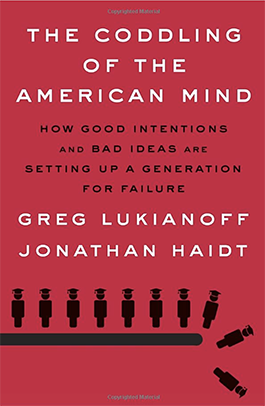

Rearing and Educating Our College-Bound Children
Source/Author: Mike Murphy, Headmaster
March 06, 2020
At the recommendation of a fellow headmaster, I recently read "The Coddling of the American Mind." The authors who wrote a highly acclaimed article with the same title in 2015 continued their research to write this book. It strikes me that it is one of those books that will appeal to people who believe in the thesis the authors present and will, at the same time, enrage those for whom the authors are greatly concerned.
The book begins with and is organized around what the authors term, “Three Great Untruths.”
1. The Untruth of Fragility: What doesn’t kill you makes you weaker.
2. The Untruth of Emotional Reasoning: Always trust your feelings.
3. The Untruth of Us Versus Them: Life is a battle between good people and evil people.
The authors assert that “students are learning to think in distorted ways and this increases their likelihood of becoming fragile, anxious and easily hurt.”
The book is designed to make us think about how we are rearing, educating and preparing our children for their adult lives and careers. With few exceptions the most successful people I know are resilient, persistent, hardworking lifelong learners. They have learned to be criticized, second guessed, attacked, sued, fired and double crossed. They are people who have remained optimistic, engaged, philanthropic and increasingly creative in all aspects of their lives. Somewhere and somehow during their development they cultivated the coping skills to overcome the challenges they would encounter.
What do we want for our children? Are we willing to let them get some lessons from the school of hard knocks? Are we willing to let them deal with the consequences of their behavior even if those consequences appear harsh and potentially life-changing? Are we willing to employ tough love? Will we find ways to help them get around challenges? Will we buy their seat at a university? Cheat for them? Lie for them? Bulldoze a path to happiness for them?
As I continued to read "The Coddling of the American Mind" it occurred to me that many people will dismiss the entire book because it challenges some popularly held beliefs. For example, the authors present studies that do not deny the potential dangers of food allergies but show that early exposure to foods can reduce rather than increase allergies. They provide examples of how students learn to seek the “least generous interpretations possible” when hearing ideas or words that may be termed microaggressions.
What concerns the authors is that if people are so affected by external factors rather than their own internal sense of self and dignity, those people are more prone to pain from any kind of adversity. The authors go on to point out the dangers of “common enemy politics” that move us away from a “common humanity” approach to viewing the world.
Chapter 8, “Paranoid Parenting,” will surely get the blood flowing and neurons moving in the brains of many. “The Decline of Play,” chapter 9, is one all of our educators of young children will want us to note. And Chapter 12, “Wiser Kids,” holds some gems for all of us. For those looking for a shortcut, there are YouTube interviews with Greg Lukianoff and Jonathan Haidt, the authors. In addition, at the end of each chapter the authors summarize the key point they have made.
If one is open to the idea of free speech and the importance of multiple perspectives, this is a valuable book and important ideas to consider as we do our best to rear and educate our children and hopefully, our future leaders.
Cheers,
Mike
PS: By coincidence I had the opportunity to hear Jonathan Haidt speak at the National Association of Independent School conference in late February. His data on the increased levels of depression and anxiety being exhibited by our current students (Gen Z) are not surprising but still very concerning. He gives advice to support our children that is not all listed in his book. His first suggestion is to deny students the use of smartphones until high school with the exception being for communication to parents. Forbid any use of social media. He also suggests that high school students not be able to touch a phone until the end of the school day. The correlation between the increase in psychological disorders and the increased use of social media is hard to argue.
PS: By coincidence I had the opportunity to hear Jonathan Haidt speak at the National Association of Independent School conference in late February. His data on the increased levels of depression and anxiety being exhibited by our current students (Gen Z) are not surprising but still very concerning. He gives advice to support our children that is not all listed in his book. His first suggestion is to deny students the use of smartphones until high school with the exception being for communication to parents. Forbid any use of social media. He also suggests that high school students not be able to touch a phone until the end of the school day. The correlation between the increase in psychological disorders and the increased use of social media is hard to argue.
























